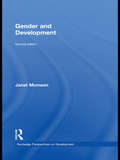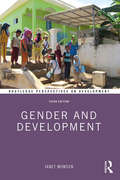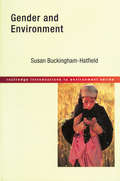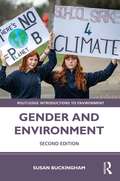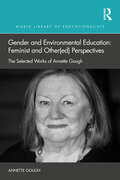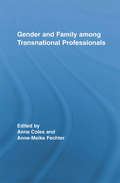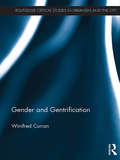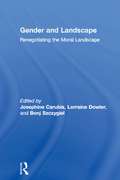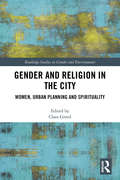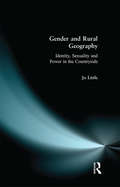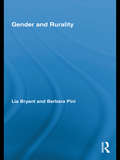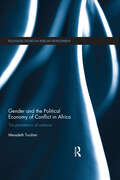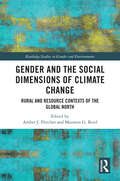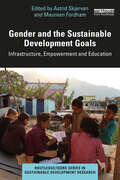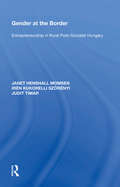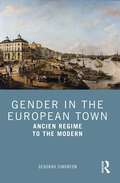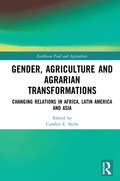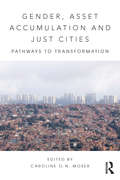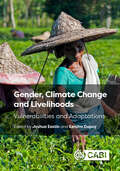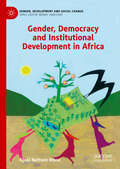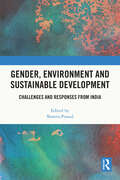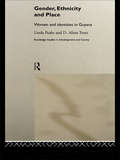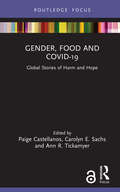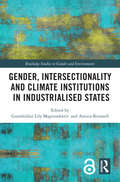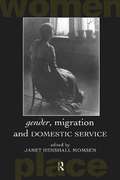- Table View
- List View
Gender and Development (Routledge Perspectives on Development)
by Janet MomsenGlobal financial problems, rising food prices, climate change, international migration - increasingly by women - conflict situations in many poor countries, the spread of tropical diseases such as malaria and dengue fever and the increased incidence of HIV/AIDS and TB, and changing patterns of trade have all added new dimensions to gender issues in developing countries. These problems are frequently being brought to public attention in the media and through long-haul tourism. Consequently students' interest in gender and development has grown considerably in the last few years. This updated second edition provides a concise, accessible introduction to Gender and Development issues in the developing world and in the transition countries of Eastern and Central Europe. The nine chapters include discussions on changes in theoretical approaches, gender complexities and the Millennium Development Goals; social and biological reproduction including differing attitudes to family planning by states and variation in education and access to housing; differences in health and violence at major life stages for women and men and natural disasters and gender roles in rural and urban areas. The penultimate chapter considers the impact of broad economic changes such as the globalization of trade and communications on gender differences in economic activity and the final chapter addresses international progress towards gender equality as measured by the global gender gap. The text is particularly strong on environmental aspects and the new edition builds on this to consider the effects of climate change and declining natural resources illustrated by a case study of changing gender roles in fishing in India. There is also enhanced coverage of topics such as global trade, sport as a development tool, masculinities, and sustainable agriculture. Maps, statistics, references and boxed case studies have been updated throughout and their coverage widened. Gender and Development is the only broad based introduction to the topic written specifically for a student audience. It features student friendly items such as chapter learning objectives, discussion questions, annotated guides to further reading and websites. The text is enlivened throughout with examples and case studies drawn from the author's worldwide field research and consultancies with international development agencies over four decades and her experience of teaching the topic to undergraduates and postgraduates in many countries. It will be an essential text for a variety of courses on development, women's studies, sociology, anthropology and geography.
Gender and Development (Routledge Perspectives on Development)
by Janet MomsenThis revised and updated third edition of Gender and Development provides a concise, accessible introduction to gender and development issues in the developing world and in the transition countries of Eastern and Central Europe. The nine chapters include discussions on: changes in theoretical approaches, gender complexities and the Sustainable Development Goals; social and biological reproduction including changing attitudes to family planning; variation in education and access to housing; differences in health and violence at major life stages for women and men; natural disasters, climate change and declining natural resources, and gender roles in rural and urban areas. There is also enhanced coverage of topics such as global trade, sport as a development tool, masculinities and sustainable agriculture. Maps, statistics, have been updated throughout and their coverage widened. New case studies have been added on Bangladesh, on violence in Peru and India, halal tourism and on garbage collection in the Maldives. The book features student-friendly items such as chapter learning objectives, discussion questions, annotated guides to further reading and websites. The text is enlivened throughout with examples and case studies drawn from the author’s worldwide field research and consultancies with international development agencies over four decades and her experience of teaching the topic to undergraduates and postgraduates in many countries. Gender and Development is the only broad-based introduction to the topic written specifically for a student audience. It will be an essential text for a variety of courses on development, women’s studies, sociology, anthropology and geography.
Gender and Environment
by Susan BuckinghamAccessible and lively, this is the first introductory level text to introduce the key issues in the rapidly growing area of gender and environment. This text provides an analysis of how gender relations affect the natural environment and of how environmental issues have a differential impact on women and men.Using case studies from the developed and developing worlds, this text covers· gendered roles in the family· community and international connections· conception· giving birth· western practices· the body and the self.
Gender and Environment: Critical Concepts In The Environment (Routledge Introductions to Environment: Environment and Society Texts)
by Susan BuckinghamThis completely revised second edition of Gender and Environment explains the inter-relationship between gender relations and environmental problems and practices, and how they affect and impact on each other. Explaining our current predicament in the context of historical gender and environment relations, and contemporary theorisations of this relationship, this book explores how gender and environment are imbricated at different scales: the body; the household, community and city through concepts of work; and at the global. The final chapter draws these themes together through a consideration of waste and shows that gender is an important dimension in how we define, categorise, generate and manage waste, and how this contributes to environmental problems. Contemporary examples of environmental activism are juxtaposed with past campaigns throughout the book to demonstrate how protest and activism is as gendered as the processes which have created the situations protested about. The author’s experiences of working with both the European Union on gender mainstreaming environmental research and practice, and with environmental groups on gender-based campaigns provide unique insights and case studies which inform the book. The book provides a contemporary text book with a strong research foundation, drawing on the author’s extensive research, professional and practice activity on the gender/environment relationship over the past 20 years, in a wide range of geographical contexts.
Gender and Environmental Education: The Selected Works of Annette Gough (World Library of Educationalists)
by Annette GoughThis timely book provides a starting point for critical analysis and discourse about the status of gendered perspectives in environmental education research.Through bringing together selected writings of Annette Gough, it documents the evolving discussions of gender in environmental education research since the mid-1990s, from its origins in putting women on the agenda through to women’s relationships with nature and ecofeminism, as well as writings that engage with queer theory, intersectionality, assemblages, new materialisms, posthumanism and the more-than-human. The book is both a collection of Annette Gough, and her collaborators, writings around these themes and her reflections on the transitions that have occurred in the field of environmental education related to gender since the late 1980s, as well as her deliberations on future directions.An important new addition to the World Library of Educationalists, this book foregrounds women, their environmental perspectives, and feminist and other gendered research, which have been marginalised for too long in environmental education.
Gender and Family Among Transnational Professionals (Routledge International Studies of Women and Place)
by Anne Coles Anne-Meike FechterWhile interest in migration flows is ever-growing, this has mostly concentrated on disadvantaged migrants moving from developing to Western industrialised countries. In contrast, Euro-American mobile professionals are only now becoming an emergent research topic. Similarly, debates on the connections between gender and migration rarely consider these kind of migrants. This volume fills these gaps by investigating impact of relocation on gender and family relations among today’s transnational professionals.
Gender and Gentrification (Routledge Critical Studies in Urbanism and the City)
by Winifred CurranThis book explores how gentrification often reinforces traditional gender roles and spatial constructions during the process of reshaping the labour, housing, commercial and policy landscapes of the city. It focuses in particular on the impact of gentrification on women and racialized men, exploring how gentrification increases the cost of living, serves to narrow housing choices, make social reproduction more expensive, and limits the scope of the democratic process. This has resulted in the displacement of many of the phenomena once considered to be the emancipatory hallmarks of gentrification, such as gayborhoods. The book explores the role of gentrification in the larger social processes through which gender is continually reconstituted. In so doing, it makes clear that the negative effects of gentrification are far more wide-ranging than popularly understood, and makes recommendations for renewed activism and policy that places gender at its core. This is valuable reading for students, researchers, and activists interested in social and economic geography, city planning, gender studies, urban studies, sociology, and cultural studies.
Gender and Landscape: Renegotiating the Moral Landscape (Routledge International Studies of Women and Place #Vol. 6)
by Lorraine Dowler Josephine Carubia Bonj SzczygielGender and Landscape is a feminist inquiry into a long-ignored area of study: the landscape. Although there has been an exhaustive investigation into issues of gender as they intersect with space and place, very little has been written about the gendering of the landscape. This volume provides a bridge between feminist discussions of space and place as something 'lived' and landscape interpretations as something 'viewed'.
Gender and Religion in the City: Women, Urban Planning and Spirituality (Routledge Studies in Gender and Environments)
by Clara GreedThis book provides a conceptual, historical and contemporary context to the relationships between gender, religion and cities. It draws together these three components to provide an innovative view of how religion and gender interact and affect urban form and city planning. While there have been many books that deal with religion and cities; gender and cities; and gender and religion, this book is unique in bringing these three subjects together. This trio of inter-relationships is first explored within Western Christianity: in Roman Catholicism, Protestantism, Eastern Orthodoxy and in the Pentecostal and Charismatic movements. A wider perspective is then provided in chapters on the ways in which Islam shapes urban development and influences the position of Muslim women in urban space. While official religions have declined in the West there is still a desire for new forms of spirituality, and this is discussed in chapters on municipal spirituality and on the rise of paganism and the links to both environmentalism and feminism. Finally, ways of taking into account both gender and religion within the statutory urban planning system are presented. This book will be of great interest to those researching environment and gender, urban planning and sustainability, human geography and religion.
Gender and Rural Geography: Identity, Sexuality and Power in the Countryside
by Jo LittleGender and Rural Geography explores the relationship between gender and rurality. Feminist theory, gender relations and sexuality have all become central concerns of geographical research and significant progress has been made in terms of our understanding of both the broad relationship between gender and geography and the more detailed differences in the lives of men and women over space. The development of feminist perspectives and the study of gender relations in geography, has, however, been fairly uneven over the discipline. Both theoretical and empirical work on gender has tended to be concentrated within social and cultural geography. Moreover it has been directed largely towards the urban sphere.
Gender and Rurality (Routledge International Studies of Women and Place)
by Barbara Pini Lia BryantThe study of gender in rural spaces is still in its infancy. Thus far, there has been little exploration of the constitution of the varied and differing ways that gender is constituted in rural settings. This book will place the question of gender, rurality and difference at its center. The authors examine theoretical constructions of gender and explore the relationship between these and rural spaces. While there have been extensive debates in the feminist literature about gender and the intersection of multiple social categories, rural feminist social scientists have yet to theorize what gender means in a rural context and how gender blurs and intersects with other social categories such as sexuality, ethnicity, class and (dis)ability. This book will use empirical examples from a range of research projects undertaken by the authors as well as illustrations from work in the Australasia region, Europe, and the United States to explore gender and rurality and their relation to sexuality, ethnicity, class and (dis)ability.
Gender and the Political Economy of Conflict in Africa: The persistence of violence (Routledge Studies in African Development)
by Meredeth TurshenViolence affects the economy of production and the ecology of reproduction— the production of economic goods and services and the generational reproduction of workers, the regeneration of the capacity to work and maintenance of workers on a daily basis, and the renewal of culture and society through community relations and the education of children Gender and the Political Economy of Conflict in Africa explores the persistence of violence in conflict zones in Africa using a political economy framework. This framework employs an analysis of violence on both edges of the spectrum—a macro-economic analysis of violence against workers and a micro-political analysis of the violence in women’s reproductive lives. These analyses come together to create a new explanation of why violence persists, a new political economy of violence against women, and a new theoretical understanding of the relation between production and reproduction. Three case studies are discussed: the Democratic Republic of the Congo (violence in an era of conflict), Sierra Leone (violence post-conflict), and Tanzania (which has not seen armed conflict on the mainland). This book fills a significant gap on the political economy of war and women/gender for advanced undergraduate and postgraduate students as well as researchers in African Studies, Gender Studies, and Peace and Conflict Studies.
Gender and the Social Dimensions of Climate Change: Rural and Resource Contexts of the Global North (Routledge Studies in Gender and Environments)
by Amber J. Fletcher and Maureen G. ReedDispelling the myth that people in the Global North share similar experiences of climate change, this book reveals how intersecting social dimensions of climate change—people, processes, and institutions—give rise to different experiences of loss, adaptation, and resilience among those living in rural and resource contexts of the Global North. Bringing together leading feminist researchers and practitioners from three countries—Australia, Canada, and Spain—this collection documents gender relations in fossil fuel, mining, and extractive industries, in land-based livelihoods, in approaches for inclusive environmental policy, and in the lived experience of climate hazards. Uniquely, the book brings together the voices, expertise, and experiences of both academic researchers and women whose views have not been prioritized in formal policies—for example, women in agriculture, Indigenous women, immigrant women, and women in male-dominated professions. Their contributions are insightful and compelling, highlighting the significance of gaining diverse perspectives for a fuller understanding of climate change impacts, more equitable processes and strategies for climate change adaptation, and a more welcoming climate future. This book will be vital reading for students and scholars of gender studies, environmental studies, environmental sociology, geography, and sustainability science. It will provide important insights for planners, decision makers, and community advocates to strengthen their understanding of social dimensions of climate change and to develop more inclusive and equitable adaptation policies, plans, and practices.
Gender and the Sustainable Development Goals: Infrastructure, Empowerment and Education (Routledge/ISDRS Series in Sustainable Development Research)
by Astrid SkjervenThis book sheds light on the important and mostly neglected role that gender plays in achieving the UN Sustainable Development Goals, doing so by investigating three key problem areas: empowerment, education, and infrastructure. Starting with a theoretical and methodological framework, this edited collection contains 12 chapters from scholars and researchers from around the world. The book includes numerous case studies discussing the current status of gender equality relating to the SDGs. It reinforces the significance of gender for sustainable and just development, highlighting how women play a major role in work organization, disaster management, income, household maintenance, and mediation of knowledge. "Women" as a classification encompasses much diversity with many intersecting axes of difference; this book focuses on the excluded and disadvantaged majority social group, without imposing homogeneity on that categorization. Many chapters focus on critical situations occurring in the Global South, where these issues are highly prominent, and importantly, these contributions are written by local scholars. Finally, the volume provides pathways for basic and professional gender responsive education and innovation in the field. The book will generate important discussions in interdisciplinary research and higher education settings focusing on sustainable development, gender, equality, human rights, and education.
Gender at the Border: Entrepreneurship in Rural Post-Socialist Hungary (Border Regions Ser.)
by Janet Henshall MomsenLooking at two contrasting border regions, one in western Hungary, one in the east of the country, this volume is the first to combine an examination of border related issues with gender and economic development. By comparing and critically analyzing the relative levels of encouragement of entrepreneurial activities and gender differences, it highlights the importance of borders within the changing European Union. Despite the assumption that entrepreneurship would be strongest near the western border with Austria, the findings show that, on the contrary, many women in western Hungary would rather avoid the risk of being self-employed by getting well-paid jobs in Austria or working for foreigners, while in the east of the country, entrepreneurship was often the only possible way of earning a living. It also highlights the importance of setting up a business to the empowerment of women in both regions, by giving them a bigger decision-making role in the family.
Gender in the European Town: Ancien Regime to the Modern
by Deborah SimontonMoving from the mid-seventeenth century to the near present, this book marks physical and conceptual changes across European towns and examines how gender was implicated and imbricated in those changes. As places which fostered and disseminated key social, economic, political and cultural developments, towns were central to the creation of gendered identities and the transmission of ideas across local, national and transnational boundaries. From 1650 to 2000, towns grew rapidly and responded to the needs for new infrastructures, physical reconfiguration and ideas of citizenship. Gender relations vary over space and time and are continually altering; such variation underlines the need for a thorough non- or even anti-essentialism. Drawing primarily on three themes of economy, civic identity and uses of space, the volume shows that urban development, and responses to it, is not gender neutral and thus argues for the fundamental importance of a gendered perspective. Gender in the European Town is a useful resource for all students and scholars interested in urban history and its interaction with gender from 1650 to the present.
Gender, Agriculture and Agrarian Transformations: Changing Relations in Africa, Latin America and Asia (Earthscan Food and Agriculture)
by Carolyn E. SachsThis book presents research from across the globe on how gender relationships in agriculture are changing. In many regions of the world, agricultural transformations are occurring through increased commodification, new value-chains, technological innovations introduced by CGIAR and other development interventions, declining viability of small-holder agriculture livelihoods, male out-migration from rural areas, and climate change. This book addresses how these changes involve fluctuations in gendered labour and decision making on farms and in agriculture and, in many places, have resulted in the feminization of agriculture at a time of unprecedented climate change. Chapters uncover both how women successfully innovate and how they remain disadvantaged when compared to men in terms of access to land, labor, capital and markets that would enable them to succeed in agriculture. Building on case studies from Africa, Latin America and Asia, the book interrogates how new agricultural innovations from agricultural research, new technologies and value chains reshape gender relations. Using new methodological approaches and intersectional analyses, this book will be of great interest to students and scholars of agriculture, gender, sustainable development and environmental studies more generally.
Gender, Asset Accumulation and Just Cities: Pathways to transformation
by Caroline O.N. MoserWith more than half the world’s population now living in urban areas, urbanisation is undoubtedly one of the most important phenomena of the 21st century. However, despite increasing recognition of the critical relationship between economic and social development in cities, gender issues are often overlooked in understanding the complexities of current urbanisation processes. This book seeks to rectify this neglect. Gender, Asset Accumulation and Just Cities explores the contribution that a focus on the gendered nature of asset accumulation brings to the goal of achieving just, more equitable cities. To date neither the academic debates nor the formulated policy and practice on just cities has included a focus on gender-based inequalities, discriminations, or opportunities. From a gender perspective, a separate discourse exists, closely associated with gender justice, particularly in relation to urban rights and democracy. Neither, however, has addressed the implications for women’s accumulation of assets and associated empowerment for transformational pathways to just cities. In this book, contributors specifically focus on gender and just cities from a wide range of gendered perspectives that include households, housing, land, gender-based violence, transport, climate, and disasters.
Gender, Climate Change and Livelihoods: Vulnerabilities and Adaptations
by Margaret Alston Salim Momtaz Elizabeth Bryan Muhammad Asaduzzaman Nahid Rezwana Aden Aw-Hassan Elisabeth Garner Patricia E. Perkins Agnes Babugura Bipasha Baruah Abderrahim Bentaibi Quinn Bernier Yvonne Braun Boubaker Dhehibi Diana Hummel Zobaidul Kabir Edward Kato Francis Mwesigye Dina Najjar Balikisu Osman Elizabeth Opiyo Onyango Shahreen ShehwarThis book applies a gendered lens to evaluate the dynamic linkages between climate change and livelihoods in developing countries. It examines how climate change affects women and men in distinct ways, and what the implications are for earning income and accessing the natural, social, economic, and political resources required to survive and thrive. The book's contributing authors analyze the gendered impact of climate change on different types of livelihoods, in distinct contexts, including urban and rural, and in diverse geographic locations, including Asia, Africa and the Caribbean. It focuses on understanding how public policies and power dynamics shape gendered vulnerabilities and impacts, how gender influences coping and adaptation mechanisms, and how civil society organizations incorporate gender into their climate advocacy strategies. This book: -Provides cutting-edge scholarship on an underrepresented area of climate change: the gendered impacts of climate change on livelihoods. -Covers a range of different types of livelihoods and geographic locations. -Involves contributors from a diverse array of cultural and scholarly backgrounds, bringing contrasting perspectives to the topic. This book is recommended for scholars, students, and practitioners who study or work in fields such as climate change, gender, livelihoods, public policy, economic development, and agriculture.
Gender, Democracy and Institutional Development in Africa (Gender, Development and Social Change)
by Njoki Nathani WaneThis book analyses African foundations of gender, education, politics, democracy and institutional development by stimulating theoretical discourses. It offers a discursive framework on ways to examine the conceptualizations of African social development and a critical discourse on debunking the misconceptions that are attached to African location in the global arena. The volume challenges the danger of minimizing and oversimplifying the role of Africa in the international space. This will be ideal for researchers, students and scholars in the areas of African and gender studies, development, politics and education.
Gender, Environment and Sustainable Development: Challenges and Responses from India
by Shweta PrasadThis book studies environment and sustainable development from the perspective of gender. It focuses on three major themes, including sustainability of development practices, policy perspectives on environmental management and climate change and its gendered impact. It includes contributions from academicians working across disciplines and practitioners working at the grassroots levels. The book addresses issues facing India amid a growing global environmental crisis and suggests policy measures for environmental protection and to improve the quality of life of its inhabitants. Lucid and topical, the volume will be an indispensable resource for students, researchers of gender, environment and sustainable development, sociology and public policy. It will also be a great resource for advocacy groups, non-governmental organisations (NGOs) and policymakers working in the area.
Gender, Ethnicity and Place: Women and Identity in Guyana (Routledge Studies in Development and Society)
by Linda Peake D. Alissa TrotzThis book is concerned with the nature of the relationship between gender, ethnicity and poverty in the context of the external and internal dynamics of households in Guyana. Using detailed data collected from male and female respondents in three separate locations, two urban and one rural, and across two major ethnic groups, Afro-Guyanese and Indo-Guyanese, the authors discuss the links between gender and race, exploring development issues from a feminist perspective.
Gender, Food and COVID-19: Global Stories of Harm and Hope (Routledge Focus on Environment and Sustainability)
by Paige Castellanos, Carolyn E. Sachs and Ann R. TickamyerThis book documents how COVID-19 impacts gender, agriculture, and food systems across the globe with on-the-ground accounts and personal reflections from scholars, practitioners, and community members. During the coronavirus pandemic with many people under lockdown, continual agricultural production and access to food remain essential. Women provide much of the formal and informal work in agriculture and food production, distribution, and preparation often under precarious conditions. A cadre of scholars and practitioners from across the globe provide their timely observations on these issues as well as more personal reflections on its impact on their lives and work. Four major themes emerge from these accounts and are interwoven throughout: the pervasiveness of food insecurity, the ubiquity of women’s care work, food justice, and policies and research that can that can result in a resilience that reimagines the future for greater gender and intersectional equality. We identify what lessons we can learn from this global pandemic about research and practices related to gender, food, and agricultural systems to strive for more equitable arrangements. This book will be of great interest to students, scholars and practitioners working on gender and food and agriculture during this global pandemic and beyond.
Gender, Intersectionality and Climate Institutions in Industrialised States (Routledge Studies in Gender and Environments)
by Gunnhildur Lily Magnusdottir and Annica KronsellThis book explores how climate institutions in industrialized countries work to further the recognition of social differences and integrate this understanding in climate policy making. With contributions from a range of expert scholars in the field, this volume investigates policy-making in climate institutions from the perspective of power as it relates to gender. It also considers other intersecting social factors at different levels of governance, from the global to the local level and extending into climate-relevant sectors. The authors argue that a focus on climate institutions is important since they not only develop strategies and policies, they also (re)produce power relations, promote specific norms and values, and distribute resources. The chapters throughout draw on examples from various institutions including national ministries, transport and waste management authorities, and local authorities, as well as the European Union and the UNFCCC regime. Overall, this book demonstrates how feminist institutionalist theory and intersectionality approaches can contribute to an increased understanding of power relations and social differences in climate policy-making and in climate-relevant sectors in industrialized states. In doing so, it highlights the challenges of path dependencies, but also reveals opportunities for advancing gender equality, equity, and social justice. Gender, Intersectionality and Climate Institutions in Industrialized States will be of great interest to students and scholars of climate politics, international relations, gender studies and policy studies.
Gender, Migration and Domestic Service (Routledge International Studies of Women and Place)
by Janet Henshall MomsenThis book examines a wide range of migration patterns which have arisen, and exposes the tensions and difficulties including: * legal and empowerment issues * cultural and language diversities and barriers * the impact of live-in employment. The book features case studies taken from Europe, South and North America, the Caribbean, Asia, and Africa and uses original fieldwork using quantitative and qualitative methods.
